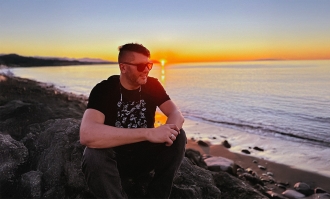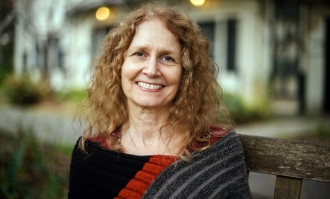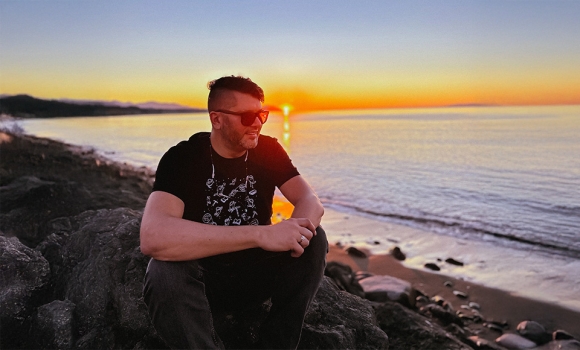Whether you are a poet looking to hone your craft, an aspiring novelist who wants to get that book written, or a memoirist with an urgent story to tell, our MFA Creative Writing program will help you achieve your writing goals.
The MFA program fosters a supportive community of talented writers who are encouraged to experiment across genres and with new forms of writing.
In addition to the genres of Poetry, Fiction and Creative Nonfiction, Dominican offers an optional track in Narrative Medicine, which allows students to embrace the special role that creative writing can play in the process of healing.
I like the vision they have in the MFA program at Dominican. It’s a fabulous resource, this island of calm in the middle of a lot of chaos in this world.
Catharine Clark-Sayles, MFA 2019
Low-Residency MFA Program Highlights
- Flexible low-residency format customized to meet your writing goals.
- A dedicated mentor and opportunities to publish your work.
- Two on-campus residencies per year featuring dynamic speakers and workshops.
- Co-curricular activities in publishing and teaching.
- An optional track in narrative medicine.
| Application Deadlines | Tuition Rate Per Unit | Number of Units | Format and Length |
Summer: May 1 *Submissions are reviewed on a rolling basis. | $893 View Tuition and Financial Aid Information for details. | 47 Units | Low-residency 25 months |
participate in a workshop or event
Admissions and Financial Aid
A Bachelor’s degree or its equivalent from a regionally accredited institution of higher education is required to apply to our graduate programs.
-
Completed Application — Apply now!
- Official Transcript(s)
Official transcript(s) of coursework from each college or university attended (undergraduate and graduate) are required upon matriculation. Find complete instructions on how to submit your transcripts to Dominican here. - Resume
- Statement of Purpose or Intent
A brief essay (two pages, double spaced, 12-point font) describing writing background, professional and/or personal goals, and additional life and/or academic experience relevant to your application. - One Letter of Recommendation
(Elect a Personal Interview to waive this requirement.) - Writing Sample
Please submit one of the following samples of your work:- Poetry (up to 10 pages single spaced, one long poem or up to 8 individual poems, or some combination)
- Prose: (up to 25 pages double spaced. Can be one piece or multiple pieces)
- A combination of both poetry and prose (not to exceed 25 pages)
If an application deadline falls on a weekend and/or holiday, applications will be accepted through the end of the next business day.
| Summer Residency Deadline | May 1 |
| Winter Residency Deadline | December 1 |
Learn about tuition per unit, additional fees and total tuition.
We'll also show you how a Dominican education is more affordable than you might think with support from financial aid, scholarships and loans.
Creative Writing Residencies
Our low-residency format consists of twice-yearly residencies and semester-long distance mentorships, allowing students to advance a writing career without disruption to work or family.
The degree consists of five residencies (three summer sessions and two winter sessions) over the course of two years. Each 8-day residency consists of morning workshops, afternoon talks, and evening readings. Four semesters of distance mentorship provide a personalized academic experience based on each student’s individual writing goals.
| Summer Residency | June 5-14, 2025 |
| Winter Residency | January 10-17, 2026 |
Current Student and Alumni Opportunities and Events
The MFA program offers over a dozen creative writing events throughout the year that are open to students, alumni, faculty, and the public. We offer both in-person events at Dominican and online events via Zoom. Events include:
- Creative Writing Retreats
- Writing Workshops
- Creative Writing Discussions - Special Topics
- Readings with students, alumni, faculty and guest speakers
- Dominican Writing Residency & Conference - alumni can attend the MFA Residency as non-degree students.
Join us and immerse yourself in the vibrant writing community at Dominican!
Our optional MFA track in Narrative Medicine grounds students in the art of storytelling and supports them as they take up the subject of the body and express through writing what happens when a physical or mental anguish disrupts a life.
Students will contemplate the differences between being cured and being healed of disease, and the therapeutic role creative writing can play in the process of healing.
History of Narrative Medicine
The term “Narrative Medicine” typically applies to the inclusion of literary study as an integral part of the education of caregivers. In these programs, medical students, doctors, and other caregivers practice the art of attentive listening through the close reading of creative literature.
Close reading trains caregivers to follow clues to a patient’s illness that may not have a physical symptom, to listen for subtexts and hear significant metaphors within the patient’s narrative. Close reading also helps to nurture the qualities of empathy and compassion, qualities that have traditionally been nurtured by the arts and humanities.
To receive regular updates about our program, including information about upcoming admissions events, workshops and residencies, please sign up for the MFA Newsletter.
To read prior newsletters, view the MFA newsletter archives.
Band Practice
Each week, you can join MFA students and alumni can join an online writing drop-in session. Band Practice is a supportive space to generate new writing and develop a strong writing practice.
Coffee with Classmates
At residencies, MFA students host group conversations on topics related to being a writer, the craft of writing, and the literary world. Through Coffee with Classmates students have a direct voice in the content and focus of each residency. It also provides an opportunity for students to develop their teaching and leadership skills.
MFA Student Assistantships
MFA graduate student assistant positions offer experience in writing, social media, and editorial management of the Tuxedo Literary Magazine. These positions are conducted largely remotely with occasional on-campus events.
Editorial Experience and Writing Contests
The MFA program runs various co-curricular activities that provide students with insights into literary publishing. MFA students serve as editors for the Tuxedo literary journal and review submissions to writing contests.
Graduates of the MFA program enter into a supportive and active alumni community. Our alumni have many opportunities to participate in creative writing and professional development opportunities at Dominican including:
- Weekly Band Practice writing sessions
- Teaching Assistantships at Residencies
- On-campus Creative Writing Retreats in Fall and Spring
- Select Residency events including an Alumni Reception
- Online writing workshops
- Give public readings alongside current students and faculty at local venues, writing conferences and festivals
- Publication opportunities in the MFA Newsletter and Tuxedo literary journal
- Access to a private Linkedin MFA Alumni group
Career Paths
Graduates of Dominican’s MFA in Creative Writing program are ready to pursue a variety of careers as a writer, as well as work in related fields such as education, teaching, editing, marketing, publishing, grant writing, and nonprofit arts organizations.
Meet Our Mentors
Judy Halebsky
Judy is the author of the poetry collections “Tree Line and Sky=Empty” which won the New Issues Prize. Her chapbook “Space/Gap/Interval/Distance” won the Poets-Under-Forty award from Sixteen Rivers Press. On a MEXT fellowship from the Japanese Ministry of Culture she trained in Butoh dance at the Ohno Studio in Yokohama and studied Noh theatre at Hosei University in Tokyo. Her translations of poetry from Japanese to English include work by Yuka Tsukagoshi and Mizuho Ishida Most recently, she has written essays on Moth-style storytelling and the poet Chana Bloch. See full bio here.
Joan Baranow
Joan founded and teaches in Dominican’s MFA program in creative writing. Her poetry has appeared in The Gettysburg Review, The Paris Review, JAMA, Feminist Studies, Spillway, and other magazines. Her poetry has also appeared in the anthologies that focus on writing and healing: Women Write Their Bodies: Stories of Illness and Recovery (Kent State, 2007) and The Art of Medicine in Metaphors (Copernicus Healthcare, 2012). She has published four books of poetry, most recently In the Next Life (Poetic Matrix Press, 2019). A Fellow of the Virginia Center for the Creative Arts and long-time member of the Squaw Valley Community of Writers, she has won individual artists fellowships in poetry from the Marin Arts Council and from the Ohio Arts Council. With her husband, physician, and poet David Watts, she produced the PBS documentary “Healing Words: Poetry & Medicine.” Her second documentary, “The Time We Have,” presents an intimate portrait of a young woman facing terminal illness. See Joan's full bio here.
Claudia Morales
Claudia Morales (1988) is an author and scholar from Chiapas, Mexico. Her debut novel, No Habrá Retorno (Coneculta Chiapas 2015, reissued by Los Libros del Perro 2021) won the prestigious National Rosario Castellanos Prize for Short Novels. Her work has been supported by the Fulbright Program and the Foundation for Mexican Letters where she was a writing fellow. Claudia's stories have been featured in Rio Grande Review 2022, The Offing Magazine 2021, Lunch Ticket 2019, Ficción Atómica (Palindroma 2020), Mexicanas: Trece Narrativas Contemporáneas (Fondo Blanco 2021) and her second novel Calao Bicorne is forthcoming in Fondo Blanco, Spring 2023. See Claudia's full bio here.
Thomas Burke
Thomas Burke is the author of the fiction collection Where Is Home from Fithian Press. His work has been published in reviews including The James White Review, Harrington Gay Men’s Fiction Quarterly, The Chiron Review, and the Evergreen Chronicles; in webzines; and in anthologies including Queer and Catholic (Routledge). Twice nominated for a Pushcart prize, he received the Steven L. Smith Prize for Gay Fiction. See full bio here.
Marianne Rogoff
Marianne Rogoff, PhD, is the author of the Pushcart-nominated story collection Love Is Blind in One Eye, the memoir Silvie’s Life, and numerous travel stories, short fictions, essays, and book reviews.
Since 2018, her writing has been a Finalist in Narrative magazine’s Spring Story Contest, Top 10 for the Tillie Olsen Story Award, on the Short List for the Bath International Novella-in-Flash Award, Top 10 for Sequestrum Editor’s Reprint Award, Finalist for ScreenCraft’s Cinematic Short Story Award, Semifinalist for the Tamaqua Award from Hidden River Arts for a book of essays, and Finalist for the Ernest Hemingway Flash Fiction Prize. As adjunct professor at Dominican University, she teaches fiction, creative non-fiction and the personal essay.
Kim Culbertson
Kim Culbertson is the author of the YA novels Songs for a Teenage Nomad (Sourcebooks 2010), Instructions for a Broken Heart (Sourcebooks 2011), which was named a Booklist Top Ten Romance Title for Youth: 2011 and also won the 2012 Northern California Book Award for YA Fiction, Catch a Falling Star (Scholastic 2014), The Possibility of Now (Scholastic 2016), which was named a Bank Street Best Children’s Book of the Year (2017 edition), and The Wonder of Us (Scholastic 2017). Much of her inspiration comes from her background teaching high school since 1997. In 2012, Kim wrote her eBook novella The Liberation of Max McTrue for her students, who, over the years, have taught her far more than she has taught them. Kim also works as a fiction mentor for the Dominican University MFA in Creative Writing. She lives in Northern California with her husband and daughter.
Robert F. Bradford
Robert F. Bradford writes plays, stories, poems and songs. His work has been honored with two Bay Area Theatre Critics Circle Awards. His writing has been published in Raven’s Perch, Strange Encounters, Pithead Chapel, and elsewhere.
Lee Kravetz
Lee Kravetz is the author of the national bestselling novel The Last Confessions of Sylvia P., (The Millions Most Anticipated Pick and A GMA March Reads Pick) as well as acclaimed nonfiction, Strange Contagion and SuperSurvivors. He has written for print and television, including The New York Times, New York Magazine, Psychology Today, The Daily Beast, The San Francisco Chronicle, and PBS. He lives in Berkeley with his wife and two children.
Iris Jamahl Dunkle
Iris Jamahl Dunkle is an award-winning literary biographer and poet and former Poet Laureate of Sonoma County, CA. Her latest books include the biography Charmian Kittredge London: Trailblazer, Author, Adventurer (University of Oklahoma Press, 2020) and her poetry collection West : Fire : Archive (The Center for Literary Publishing, 2021). Her next biography Done Dirty: Sanora Babb, the American West, and a Forgotten Literary Masterpiece will be published by the University of California Press in 2024. Dunkle received her MFA from New York University and her Ph.D. from Case Western Reserve University. She’s received fellowships from Biographers International, Vermont Studio Center, and Millay Arts.
Frequently Asked Questions
How will an MFA in Creative Writing degree help my career?
The MFA is designed to support poets and writers who wish to complete and publish a book manuscript. Thus, the focus is on honing your writing skills and learning about the publishing industry.
However, since the MFA is recognized as a terminal degree in academe, you would be eligible to apply for college-level positions. You will also be prepared for jobs that require strong writing skills, such as publishing, editing, marketing, public relations, social media and web content strategy.
Are scholarships available?
MFA Endowed Scholarship
The Matthew Henderson Award is an endowed scholarship that supports MFA students and is awarded on the basis of merit and need. All MFA students who apply for financial aid will be considered for this scholarship.
Dominican MFA Tuition Discount
We offer a tuition discount of $300 each semester to many students enrolled in the program.
Alpha Omicron Rho
We are home to the Alpha Omicron Rho chapter of the English Honor Society Sigma Tau Delta, which offers graduate level scholarships.
MFA Student Assistantships
Students may apply for graduate student assistantships in writing, social media, and editorial management of the Tuxedo Literary Magazine. These positions are conducted largely remotely with occasional on-campus events.
What is the length of your program?
Our MFA starts with a residency and runs for two years, for a total of five residencies and four mentorship semesters.
May I take longer than two years to complete the program?
Yes. You have up to five years to complete the MFA in Creative Writing program. Consult with the graduate director to create a degree plan.
May I focus on more than one genre?
Yes, with the approval of a mentor and the graduate director.
What happens during the mentorship semesters?
During semester-long mentorships you will be writing towards the goals outlined in your individualized syllabus. Once a month you will meet with your cohort group for a workshop and one-on-one sessions with your mentor. Workshops and faculty mentor sessions are held online. Your mentor is always available for support and instruction throughout the semester.
How many students are enrolled in your program?
All MFA students attend the winter (January) and summer (June) residencies together. During the Fall and Spring mentorship semesters, students are broken out into smaller groups of three to five students per mentor, in accordance with the AWP guidelines and best teaching practices.
How can I support the MFA program at Dominican?
Thank you for supporting the MFA program. Gifts to Dominican University of California have a profound impact on our students.
Degrees Offered
MFA
School/Department
Course Catalog
Program Contact
Assistant Director of Graduate Admissions











